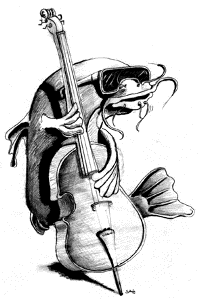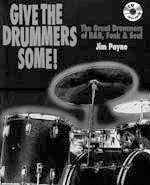


 | ||
 |

When we talk about great stars, we're generally thinking frontpeople, the ones with the familiar names that nobody can take their eyes off when they're onstage, mostly singers, guitarists, saxophonists, harmonica players and other forceful stage personalities.
And why not? It's the big names that we shell out the big bucks for. Yet no matter how big the name or how famous the artist, the onstage show is a collaborative effort, a collective force of talent that keeps the stars at the forefront.
Nearly every successful stage performer, especially in blues and R&B, would fail without a great drummer, but, quick, how many can you name? If the drummer can't keep time or create a seamless bottom with the bass player, the star is doomed. But they remain the ghosts in the onstage machine, faceless pawns in the game of starmanship; all we remember is that they keep that steady beat that keeps us riveted to the stars.
Drummer Earl Palmer enriched the music of Fats Domino, Little Richard, the Righteous Brothers and Ike and Tina Turner, among others. Without Clayton Fillyau, James Brown's performance of October 24, 1962, might have just been another long-forgotten midnight set at the Apollo. Al Jackson put the T in the music of Booker and the MGs.
Jim Payne, a drummer himself, began making drum transcriptions
of famous songs, which led him to find out more about the men
who created the beats that defined blues, soul and funk. He looked
up Fillyau and 22 other influential stickmen, interviewed them
and brought their stories together in a book,
 Give the Drummers
Some! (Warner Brothers Publications). Given the odds that
someone else might do this again (the only other book I have on
drummers is Max Weinberg's 1984 The Big Beat), it
just might be the only and last word on these particular subjects.
Give the Drummers
Some! (Warner Brothers Publications). Given the odds that
someone else might do this again (the only other book I have on
drummers is Max Weinberg's 1984 The Big Beat), it
just might be the only and last word on these particular subjects.
By gathering the stories of all these "unknowns," Payne winds up with a personal, anecdotal history of soul music that stretches from the '40s through the '80s. He begins, of course, with Palmer, the erstwhile New Orleans rhythmmeister. As Palmer -- now 73 and a most important link between '40s jazz and the rock era -- explains, his early revelation came from an attempt to incorporate the sound of three or four drummers of a mobile parade band on a single drum kit. "It was a mixture of the bass drum beat that one guy was playing and the snare drum beat that one guy was playing and the snare drum beat that another guy was playing," he tells Payne. "They were playing syncopated things that were meshing with the snare drum. I tried to do that on a set of drums."
The most interesting section is the one titled simply "Drummers Who Recorded With James Brown." Every stage of Brown's career can be traced to some kind of rhythm change, and Payne manages to track down seven of the people who made the hardest working man in show business work harder.
Fillyau (pronounced Filly-aw), the man credited with creating the distinctive James Brown beat, puts a finer point on those early breakthroughs: "Drummers used to be a metronome, a time keeper. Now it's an instrument that you have to play," says Fillyau, 63 and now living in Hephzibah, Georgia. "It's been years coming, but now it's a significant part of music."
The Brown chapter takes up a quarter of the book, and for good reason. Fillyau's "shum, doom, pop -- shug-a-doom, pow" is perhaps the most famous and certainly the most influential beat in soul music, and he and the others, Melvin Parker, John "Jabo" Starks, Clyde Stubblefield, Tiger Martin, Jimmy Madison and Allan Schwartzberg, trace its evolution through Brown's seminal '70s innovations, the stepping-off place for disco, funk, rap and everything else that's come along since.
Give the Drummers Some is directed at drummers themselves, and includes Payne's drum beat transcriptions and a compact disc with every beat discussed in the book. The layout is pretty basic, but there are plenty of pictures and charts of the drummers' accomplishments, all of which makes it an invaluable read for anyone interested in the day-to-day logistics behind some of the most influential records and bands of the last 40 years.
(If you can't find Give the Drummers Some in a bookstore -- it's a kind of specialty book -- you can order it directly from Payne by email for $29.95 plus $5 shipping at fitz@westnet.com or through Note Service Music: 1-800-628-1528 ext. 214 or 215, or check the website, which includes a section of the book, at http://www.funkydrummer.com)
-- Leland Rucker
 |
 |